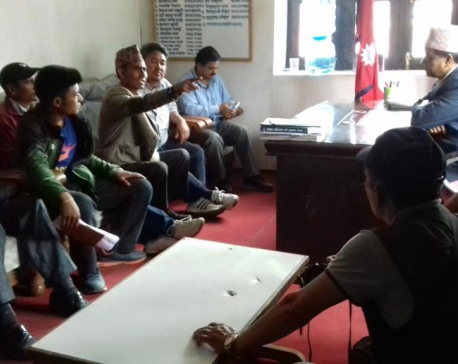
OR
Locals demand splitting the administration of Rukum district
Published On: July 23, 2017 01:59 AM NPT By: Devendra Basnet & Ganesh BK
DANG, July 23: After breaking Rukum in two provinces, the government is still undecided whether to consider it a single district or make it into two different districts. A part of Rukum falls in Province 5 and the rest lies in Province 6 in the new federal set-up.
"The District Coordination Committee (DCC) needs to be established within 30 days of the election," said Assistant Chief District Officer Sher Bahadur Pun. The government also has not issued any circulation regarding this issue, which has led to a constitutional crisis.
The locals of eastern Rukum in Province 5 are unhappy about being ruled by the district administration based in Province 6.
Ramsur Budha, chief of Bhume Rural Municipality, said, "We do not want to be under the administration of the western part as the locals want a separate district for the eastern side." The eastern Rukum delegation is in the capital currently to discuss their demands with various leaders.
CPN (Maoist Centre) Chairman Pushpa Kamal Dahal told the delegation that their demands will be fulfilled as the party's aim of creating 77 districts is getting closer. Dahal was referring to the division of Rukum and Nawalparasi.
The delegation also met with Home Minister Janardan Sharma, former ministers Ganesh Man Pun and Barsha Man Pun who told them that they will talk with other leaders about this issue.
Eastern Rukum is mainly occupied by the Magar community. They imagine that dividing the district will help preserve their identity. "We demand for a new district as the majority of the people are Magars," said an elderly.
The eastern side has blamed the western side for discriminating against them on developmental issues. Kumari Baral, chief of Sisne Rural Municipality, said that previously the district headquarters was located at the eastern part of the district in Rukumkot. It was relocated to western Rukum in Musikot in 1973. "This has broken the harmony of the district as the eastern people have to walk for 2-3 days to reach the headquarters," said Baral.
The western side of Rukum also sees this division important. "The social and cultural aspect of eastern Rukum has its own significance," said Bihal Sharma, chief of Chaurjahari Rural Municipality. He agreed with the fact that it should be made two different districts based on the social and cultural aspect.
Local Development Officer Narendra Kumar Rana said, "It is not easy to form a coordination committee from the same district in two different provinces." He also said that without the decision of the government, they are helpless in making district coordination committee in the divided district of Rukum. According to LDO Rana, the committee has informed the government that altogether nine local units are in the district.
You May Like This

Locals vandalize Jumla District Administration Office
JUMLA, July 18: The locals of Gothichaur Rural Municipality have vandalized the District Administration Office, Jumla accusing that Local Development Officer... Read More...

Dailekh locals demand execution of long halted development projects
DAILEKH, Nov 30: The overdue big development projects in the district are still awaiting execution. The right time for the... Read More...

Locals demand royalty for water supplied to valley
KATHMANDU, Nov 3: Locals affected by the Melamchi Water Supply Project (MWSP) have demanded that they be paid royalty of Rs... Read More...







Just In
- NRB to provide collateral-free loans to foreign employment seekers
- NEB to publish Grade 12 results next week
- Body handover begins; Relatives remain dissatisfied with insurance, compensation amount
- NC defers its plan to join Koshi govt
- NRB to review microfinance loan interest rate
- 134 dead in floods and landslides since onset of monsoon this year
- Mahakali Irrigation Project sees only 22 percent physical progress in 18 years
- Singapore now holds world's most powerful passport; Nepal stays at 98th











Leave A Comment